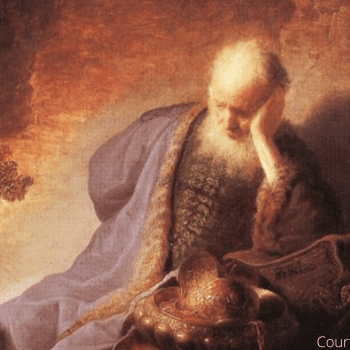Monday: Read 1 Thess 1:1-10; Acts 17:1-9
Thessalonians is one of Paul’s first letters. The record of Paul’s time in Thessalonica is found in Acts 17:1-9. The city of Thessalonica was one of the largest and most important cities in Macedonia. It was an important port city along the Via Egnatia: a Roman highway that led towards Rome by way of the Adriatic sea. Roads such as the Via Egnatia, which led to the west towards the Adriatic Sea were few because the mountain range ran north to south making the passage from east to west difficult.
Thessalonica was a “free city” in the Roman empire, which meant that it was self-governing and exempt from tribute to Rome. This means that the Christian proclamation of “another king” (Acts 17:7) would not have been taken lightly. Paul’s assurances to the Thessalonians that Jesus is not only the King, but the coming King (4:13-18) posed a problem for Rome.
Based on the record in Acts, it appears that there was significant opposition to Paul and his work in Thessalonica—mainly among the members of the Jewish community. At the same time, some of the members of the Christian community had come from paganism (1:9). This meant that pagans in the city may have viewed the new Christian community as a threat to their way and, by denying the gods of the empire, the well-being of the empire. Consequently, the persecution of the church in Thessalonica likely came from both groups (see: 1:6; 2:14; 3:3-4, 7).
Since there are no references in 1st or 2nd Thessalonians to the wealthy or to slaves, it is assumed that the community in Thessalonica was likely composed mostly of artisans.
The letter opens with Paul’s customary greeting—identifying himself, Silas, and Timothy as the authors. In 1:2-10, Paul gives an extensive word of thanksgiving. Several themes recur in this passage: including the presence of the Holy Spirit at the coming of the gospel (5); their “imitation” of Paul, Silas, and Timothy (6); and the waiting for the return of Christ (10).
Questions to ponder/discuss:
- The church in Thessalonica was suffering persecution and doing so well. Their imitation of Paul (6) was in following him in “tribulation.” Throughout the NT, tribulation is what the people of God suffer. Does this raise the question for many of us in the western world as to why we do not suffer?
- If we recognize that the church is a global body, then is it still correct to say that we do not suffer?
- What is our responsibility as members of the body of Christ towards our brothers and sisters in Christ in the world who are suffering?
Tuesday: Read 1 Thess 2:1-12
Paul begins the body of his letter in 2:1, “For you yourselves know.” In 2:1-3:13, he defends himself against accusations that were leveled against him. Since Paul says of those in the church, “you always think kindly of us” (3:6), it is likely that the charges against him came from those outside the church.
The charges primarily address Paul’s character and his message. It seems that those outside the church we accusing Paul of being no different than the many traveling teachers. Such teachers were known for coming to various towns and towing their wares only to leave quickly for the next city. The association of Paul with such teachers may have arisen because, according to Acts 17:1-9, Paul only stayed in Thessalonica for “3 sabbaths” (17:2), before he was forced to flee for his own safety.
Paul responds to these accusations, “For we never came with flattering speech, as you know, nor with a pretext for greed” (5). He then adds that he worked in order to provide for his own well-being: “For you recall, brethren, our labor and hardship, how working night and day so as not to be a burden to any of you, we proclaimed to you the gospel of God” (9).
How could Paul have been in it for the money when he never took any money from them?
Questions to ponder/discuss:
- We cannot take Paul’s practice of working in order to pay his own expenses and conclude that all who serve in ministry should do the same. Paul’s circumstances and the Roman cultural context of debt and obligation made it unwise for him to receive money from anyone. To do so, would have meant that he was now in their debt. And the last thing that Paul wanted, or was willing to do, was to be in someone’s debt. Unfortunately, many people today give and expect the church, pastor, missionary, or teacher to do as they proscribe. This is fundamentally wrong! We should give and then pray for those to whom we gave. This does not mean that godly counsel or censure cannot take place. It simply means that just because we gave money, we do not, therefore, have the right to demand that the recipient do as we demand.
- At the same, there is something to be said for taking pay and then having to worry about saying or doing something that will jeopardize one’s livelihood. Too often ministers of the gospel are either silenced by their constituents or feel obligated to say what they want to hear in order to keep the income stream coming through. I am not saying is necessarily wrong to worry about what those who give might think. This might be good pastoring. I am saying that sometimes it is wise. I fear that too often the prophetic voice of the minister, missionary, or teacher is silenced. If you decide to withhold money (gifts or offerings) because you believe your minister or teacher is espousing things that do not accord with your way of understanding the Bible, I would encourage you to first examine deeply your understanding of things and prayerfully consider the matter, before you withhold money. After all, you may be hindering the prophetic voice of the church. Remember, prophetic voices often go against the tide.
Wednesday: Read 1 Thess 2:13-20
Paul continues his response to those who were accusing him of preaching for personal gain. Paul notes that those in Thessalonica heard what Paul, Silas, and Timothy preached and they received it as “the word of God” (13).
In addition, the Thessalonians “became imitators of the churches of God” (14). This is the second time that Paul has stated that the Thessalonians became imitators. The previous occurrence was in 1:6. Note that in both places, Paul relates their imitation with suffering (see also 2 Thess 1:5).
As for the accusation that Paul came and left like other traveling teachers, Paul responds, “For we wanted to come to you” (18). In fact, Paul says, “were all the more eager with great desire to see your face” (17). Then he adds, “and yet Satan hindered us” (18). We do not know exactly what he means by Satan hindered us, but perhaps he is referring to what Luke records in Acts 17:1-9 or, that such things were continuing to hinder his ability to return.
Questions to ponder/discuss:
- Suffering is a key theme in Paul and the letters to the Thessalonians. It forms an important backdrop for much of what he is going to say. Pray for those who are persecuted. And pray that God will give you strength to be faithful in the midst of suffering. Finally, pray that God will also give you the courage to speak and act in accord with His calling even if it means suffering.
- That Satan hindered Paul should not be downplayed. Sure some blame everything on Satan. At the same time, most do not give him enough credit—which is probably just the way he likes it. Note 3:5, where Paul states that Satan is alive and well, and so he fears for the church in Thessalonica. What do you think? Is Satan still active in the life/church? What does his work look like? (NB: be careful, Satan is the master deceiver. If we think we have him figured out and that we know what his dastardly ways look like, he may well have us fooled).
Thursday: Read 1 Thessalonians 3:1-13
According to the narrative in Acts 17, Paul, Silas, and Timothy escaped the danger in Thessalonica and headed south eventually arriving in Athens (Acts 17:15). Their suffering caused many in Thessalonica to wonder. Paul assures them, “no one would be disturbed by these afflictions; for you yourselves know that we have been destined for this. For indeed when we were with you, we kept telling you in advance that we were going to suffer affliction; and so it came to pass, as you know” (3:3-4). Notice the NAS’s insertion of “kept” in 3:4. This accurately conveys the meaning of the verb. Paul was so certain that they would suffer that he repeatedly (kept telling) told the Thessalonians.
At the same time, Paul was concerned with the well-being of the new and persecuted Christian community in Thessalonica. So he decided to send Timothy to Thessalonica to check on them and support them (2). Paul was relieved when Timothy returned with good news (6).
Paul stresses that he wants to visit them again in order to aid in their spiritual development: or, as he says, “complete what is lacking in your faith” (10). Notice that for Paul one of the primary ways that their spiritual development is manifested is when they “increase and abound in love for one another, and for all people” (12).
Questions to ponder/discuss:
- Do you consider spiritual maturity to be the act of completing “what is lacking in your faith”? Do you consider it necessary or simply optional—thought perhaps a good thing to do? How do you think Paul would answer these questions?
Friday: Read 1 Thess 4:1-8
Paul encourages the Thessalonians by noting that they are indeed walking and pleasing the Lord, but he adds, “that you excel still more” (1). Paul’s language here is not suggestive. In fact, when he states, “we request and exhort you in the Lord Jesus” (1), he is using strong language (cp the use of “exhort’ in Rom 12:1; 1 Cor 1:10; 4:16; Eph 4:1).
Note also that Paul is not merely exhorting them, but he is doing so “in the Lord” (1). In fact, in 4:2, Paul says, “For you know what commandments we gave you by the authority of the Lord Jesus.”
In addition, we should observe that Paul is talking about how they “ought to walk and please God” (1). The Greek, in fact, may be translated as: “how it is necessary for you to walk and to please God” (1).
In particular, Paul was concerned that they “abstain from sexual immorality” (3). It seems that Timothy’s report included the fact that adulterous relations were going on (6). Paul’s response is quite direct: “God has not called us for the purpose of impurity, but in sanctification” (7).
Questions to ponder/discuss
- The issue of sexual immorality is a consistent one in the NT. Of course, this should not be surprising since it was a real problem in the Greco-Roman world and it is a consistent issue in much of human history. It seems, however, that many churches today are obsessed with the issue of sexual immorality mostly with regard to the LGBTQ+ issue and they are not as concerned with other forms of sexual immorality. One of the more significant issues that does not seem to garner enough attention is the proliferation of pornography. The number of people who abuse pornography in our society surely indicates that many within our churches are partakers as well. Pornography is not merely a degrading of sexual relations and sexual conduct, but it also objectifies and dehumanizes persons. If you struggle with sexual immorality or pornography, seek professional help immediately. After all, as Paul says, “God has not called us for the purpose of impurity, but in sanctification” (8).















